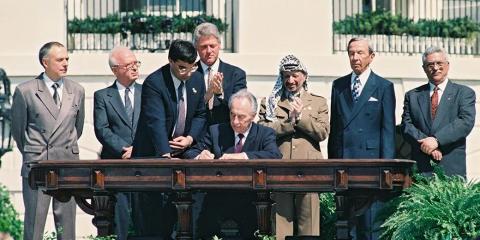Why did the Oslo agreements fail?
“I want to start by saying, this is not an easy agreement,” Rabin began the discussion. No one was being smeared, certainly not ourselves. Where in Israel today is there open discussion such as that government conducted, in which it was truly permitted to think differently and to express what one believed? To think that Likud prides itself on being a democratic party because its holds primaries. Yes, there are primaries, but is it permitted to think differently from everyone else?
Rabin adds immediately: “Obviously, had we negotiated with ourselves, I’m sure the wording would have been far better.” That phrase, negotiating with ourselves, was repeated a few times during the meeting. It may sound trivial – of course negotiations are with the other side, not with ourselves. But it’s hard to think of a better description of what Israel under Benjamin Netanyahu has been doing for over a decade.
Reading the document shows what most of us already knew: They knew it was a complex agreement, that there were risks, that “the problems will be hard,” as Rabin put it, that autonomy would pose serious security problems. “There is a need to share partnership with the Palestinians, when you do not know for certain how they will behave in the arrangement.” Therefore, “We will have to do it in stages.”
Rabin acknowledged the difficulties and explained their source. “The whole idea of autonomy, the interim agreement …was conceived when there was almost no settlements in the territories.” And he acknowledged what can’t be said today because of the right’s political-correctness police: “Jewish settlement, particularly in densely populated areas, complicated matters – that was its political goal. It was political, not related to security, with no security benefit. (I would almost say the opposite, but I won’t).” He concluded: “Despite it all, I believe we must take this path.”
After I read, and spent a few moments in the world of yesteryear, I watched Amit Segal on Channel 12 News, reading the minutes in a mocking tone. He called Oslo a catastrophe akin to the 1973 Yom Kippur War. “Eyes wide shut,” is how he described the willingness of Israel’s last action heroes to take a risk for the sake of a better future.
He only forgot to mention that he himself represents the other side: the extremists on both sides, Jewish and Palestinian, who opposed Oslo because they oppose a territorial compromise, and together they sabotaged the effort, out of shared interests. It takes chutzpah of biblical proportions to attribute the “failure” of Oslo to the Palestinians, as if what thwarted it was not first and foremost Rabin’s assassination. And as if those who thwarted it were not first of all those who murdered him.
The true story, journalistically and historically, is that Oslo failed because the settlers and their helpers succeeded in foiling it, together with their Palestinian terrorist partners. Baruch Goldstein, Yigal Amir and all the suicide bombers on the other side. Segal is not an objective journalist covering the “failure” of Oslo. He is a political agent who is continuing the thwarting of Oslo.
Carolina Landsmann

